-
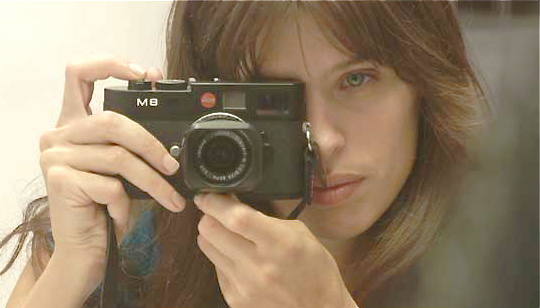
MAÏWENN IN POLISSE
MAÏWENN: POLISSE (2011)
Child abuse, Paris north
A northern Paris police "child protection" squad is the subject Polisse (a French child’s intuitive spelling of “Police”), a naturalistic, improvisational third film from the actress-director Maïwenn. This Jury Prize winner at Cannes may to some extent -- but not entirely -- make up in its realism and varied content what it lacks in organization. The topics/incidents range broadly, from physical and sexual abuse in families to the plight of homeless African immigrants to a schoolteacher’s pedophilia to a police sting in a mall that leads to a gunshot wound. Certainly some of the material brought up is shocking in nature, and this may explain some of the local interest. But child sexual abuse has been more searchingly and thoroughly dealt with in other films, such as the Canadian The Boys of St. VIncent. The emphasis is not so much on the kids as on the interactions among and psychological impact upon the police staff members, who all too frequently give in to freakouts at home and on the job. This Canal+ production has some of the marks of made-for-TV material, despite its good reception at Cannes and apparently decent box office in French theaters. The film, thought it amply shows its actor/director's ability to draw lively performances from her cast, tries to do too much and thereby lacks depth in exploring any particular characters or incidents. Maïwenn maintains a gritty intensity throughout, but when it was over I felt like someone at a smorgasbord who’d sampled too many mouthfuls of a lot of different spicy dishes.
The cast includes Karin Viard, Joeystarr, Marina Foïs, Nicolas Duvauchelle, Maïwenn, Karole Rocher, Emmanuelle Bercot, Frederic Pierrot, Arnaud Henriet, Naidra Ayadi, Jeremie Elkhaim, Ricardo Scamarcio, Sandrine Kiberlain. Joeystarr, an Afro-look rapper with his own real life history of run-ins with the law, dominates as Fred, a macho unit member whose own relations with his own small daughter seem overly erotic and who is given to violent outbursts against suspected offenders. Maïwenn herself plays the relatively uninteresting role of a photographer newly assigned to do a series on the program who soon becomes romantically involved with Fred. As Matthieu, the interesting but here underused actor Nicolas Duvauchelle plays a member of the squad who becomes overly attracted to his married police partner Chrys (Karole Rocher) and is wounded in the hastily presented mall sting sequence, allowing for a hospital scene.
In all the detail of constant randomly-arranged incidents the director, who co-scripted with cast member Emannuelle Bercot, seems forced to pump up some action to greater extremes to have a few highlights. Reviewing at Cannes, Boyd van Hoeij of Variety felt the film despite its faults “has enough highlights to arrest savvy arthouse patrons worldwide," but I was left disappointed by the lack of depth and focus. Von Hoelj himself notes that the point of view of the child victims is rarely explored here, and most of the action takes place on police department premises. This focus on adults goes against the misleading local publicity for the film, which at least appears to center on the children. The colorful Paris posters and Colonne Morris publicity for Polisse (see above) are almost in their way more exotic and intriguing than the film itself, which wastes a lot of realistic acting on badly organized and in some cases hasty assemblages of scenes.
Maïwenn's full name is Maïwenn Le Besco. She is the sister of Isild Le Besco. At 16 she had a child by Luc Besson.
Polisse opened in Paris October 19, 2011.
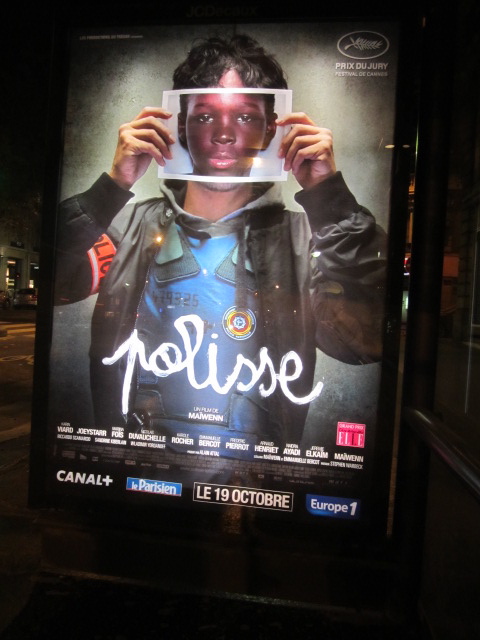
PARIS STREET POSTER FOR POLISSE
Last edited by Chris Knipp; 08-04-2015 at 03:25 PM.
-
JULIE DELPY: LE SKYLAB (2011)
[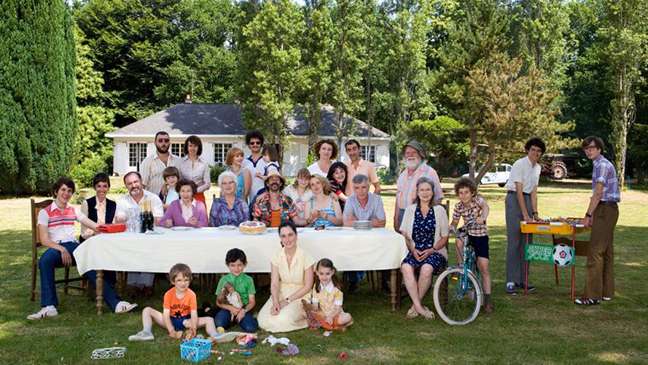
Eating and talking in Brittany, summer 1979
Along with the shapeless child protection police film Polisse, current Paris cinematic offerings include the previously released Le Skylab, Julie Delpy’s third directorial outing and a nostalgic wallow in French family life in the late Seventies. The action revolves around a big gathering of multiple cousins at an unpretentious summer house in St. Malo, in Brittany, nominally on the eve of the projected 1979 Skylab crash. The local occasion is the birthday of grandma Amandine (Bernadette Lafont). By the convention of a perfunctory framing device all this is the recollection of Amandine’s granddaughter Albertine, who in the present day is played briefly by Karin Viard, and back then as a ten-year-old is played by Lou Alvarez, one of several child actors who add charm to the busy proceedings. Delpy wrote, directed, and stars. Though the tone of the film is uneven, the characters, especially the younger ones, are not uninteresting.
The main action opens with the drive from Paris with Albertine’s leftist, fuzzy-headed dad Jean (Eric Elmosnino) at the wheel, accompanied by his wife and Albertine’s mom Anna (Delpy) and Anna’s mother, Lucienne (Emmanuelle Riva).
Once they arrive, to be greeted by Jean’s five siblings and their families plus an older uncle called Hubert (Albert Delpy), just following who they are all may be a bit difficult. There is no central event. Everybody sits at the traditional big table out on the lawn eating. A big hunk of meat is barbecued. It rains off and on and they all rush indoors, then set up outside again. There is a trip to the beach, and there is a lot of talk and some arguing about politics and other topics. The older ladies reminisce about WWII and Vietnam. Only Albertine worries about whether the Skylab space station’s impending crash will endanger them all: this is really just a dating device.
Hollywood Reporter describes Albertine as " a very Woody Allen type of jeune fille— a death-obsessed, lovelorn, bespectacled bookworm. " While the kids play outdoor games, no handheld devices in sight, adults' action consists largely of conversation, and planting the leftist dad allows for the drama of conflict with more right wing siblings. As Hollywood Reporter notes, the liveliest of these is "volatile ex-soldier Uncle Roger (Denis Ménochet)." But this is where the uneven tone is most felt. The review contines, "While Inglourious Basterds scenestealer Ménochet's bullish intensity initially brings welcome tonal changes in what's otherwise often a warmly fluffy affair, his character's belligerence, tormented anguish and drink-fueled behavior end up coming across like a heavy-handed attempt to amp up elements of third-act drama." There is not the sense that Del[py, who does so well in inventing characters and bringing the summer outing to life with her excellent cast, has the conceptual or technical skill, as yet anyway, to construct a meaningful drama.
This is a nostalgia piece in which Delpy fondly remembers her childhood and has fun, with help from the art department, with the unflattering and now silly-looking styles of the period. The screenplay is intentionally a meandering one, meant to evoke the amiable disorganization of large family gatherings. Everyone seems to be having fun, characters and actors both. However, the almost total lack of urgency about the action will make this a movie that will appeal to some but bore others. The acting is the greatest point of appeal. Valerie Bernneton and Noémie Lvovsky are particularly likable as Jean’s sisters; Leo-Michel Freundlich shows great promise as Albertine’s flirtatious young cousin, and Emmanuelle Rive imbues her small part with great style and flavor.
It seems nice that after directing a somewhat arch English-language film set in France for her debut and then trying a costume piece with limited success, Delpy as decided to work in the milieu she came from with a lot of French actors playing roles putatively related to her own family experience. But whether English-speaking viewers will want to read a lot of subtitles with so little payoff in emotional or physical action seems uncertain. Le Skylab opened in France 5 October 2011; it premiered at the San Sebastian festival in Spain September 19. Screened for this review at UGC Danton, Paris. AlloCiné press rating 3.2 (64%).
Last edited by Chris Knipp; 06-18-2021 at 11:13 PM.
-
New us releases today
MARGIN CALL and MARTHA MARCY MAY MARLENE both opened in limited release in the US today. You'll find my review of them both on Filmleaf, the first in this year's New Directors/New Films series, the second in the recent NYFF coverage. Both are recommended.
-
BERTRAND BONELLO: L'APOLLONIDE: SOUVENIRS DE LA MAISON CLOSE (2011)
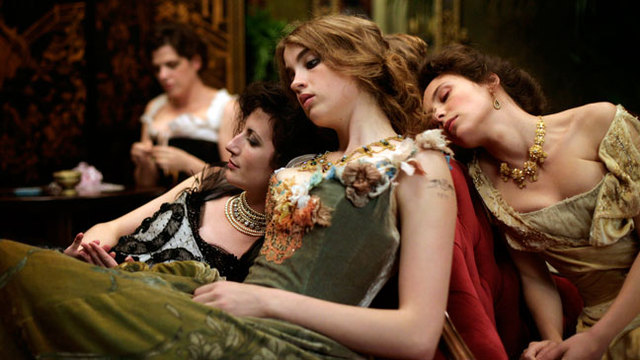
The Belle Époque's languid wild side
Apollonide (in Cannes competition in 201; House of Tolerance its English title), with an interesting cast that includes three other directors, and enriched by deeply colored, painterly images, is set in the perfumed prison of a posh French brothel in 1899, "the dawn of the twentieth century," as a title calls it. The clients are elegant, the premises are spacious, the girls are lovely, but some of the proceedings are ugly, syphilis kills, and rents and taxes are going up: this particular sex worker world is coming to an end. Bonello suffuses his atmospheric film with lush ambivalence, blending attraction and repulsion. The result that emerges is a rather peculiar mix of romantic, decadent, semi-surreal miserabilism. Apart from an outing in the country, all is indoors, dark, and floating in champagne and opium. Bonello creates a very rich mix and his film is a delight to the eyes, but there's more than a little that is creepy here.
Clearly this is a dangerous job. One girl, Madeleine (Alice Barnole) lets a regular client (Laurent Lacotte) tie her up and slashes her mouth, leaving hideous scars that make her look like The Joker. The other girls call her "The Woman Who Laughs," after the Victor Hugo novel The Man Who Laughs. She is kept on, and some clients like being with and talking to her, like one played by director Xavier Beauvois (Of Gods and Men). Though one young newcomer with voluptuous breasts, Pauline (Iliana Zabeth), an educated teenager who announces her arrival with a letter of introduction, somehow escapes, this in general is a gilded prison, a Hotel California. And the girls are indentured: they must pay the former hooker madam Marie-France (the always relaxed, appealing director Noémie Lvovsky) for all their fine clothes, and even the very wealthy regular client of Julie (Jasmine Trinca), director Jacques Nolot (utterly in his element in these louche surroundings) will not help out.
Apart from its beauty, and a cast that includes Hafsia Herzi (whose notable debut was in Aabdellatif Kechiche's The Secret of the Grain) , Céline Sallette, Jasmine Trinca, Adèle Haenel, Alice Barnole, Iliana Zabeth, Noémie Lvovsky, Xavier Beauvois, Louis-Do de Lencquesaing (star of Mia Hansen-Løve's The Father of My Children, Jacques Nolot, and Laurent Lacotte, this is one of the most detailed and specific depictions of a brothel on film. It does not spare us on the negative aspects. Besides the disfigured Madeleine, one woman dies covered with syphilitic lesions; another, clearly a burnout after 12 years in service, takes constant refuge in opium and moves around listlessly like a semi-zombie.
Bonello doesn't have a strong dramatic plot, and the resulting general lack of drive of his atmospheric film, its emphasis on the prostitutes' passivity and frequent downtime, leads inevitably to longeurs. His subject is the brothel itself, seen vaguely from the point of view of its impresario, Marie-France, who moves about brandishing a cigarette holder, pouring champagne into tall glasses, and flashing her languid smile. There is an undercurrent of her attempts to save the house from rising costs that are going to bring it down. Perhaps out of a lurid fascination that the whole film reveals (despite its unsexiness), he lingers much too much on the strangely defaced Madeleine, whose red-scarred grin never seems quite real. There's something queasy, not quite right. This is also an overbearingly sad film, that lacks the balance of any jokey, joyful moments, which one would expect from a dozen mostly young women. Though half the dozen girls gain identities, none is seen in much depth, and it all goes on too long; 20-30 minutes might have been cut. But this is still worth seeing to luxuriate in the beautiful colors, the atmosphere, and the Belle Époque nudes. Admirable cinematography by Josée Deshaies and lavish costume design by Anais Romand; and the women are of course often unclothed. This is a film that stays in the visual memory. Perhaps only that.
Apollonide: Souvenires de la maison close/House of Tolerance debuted at Cannes in May 2011 and opened in Paris September 21, 2011 to favorable though mixed reviews. (AlloCiné press rating 3.6.) A UK release January 27, 2012 is anticipated.
Last edited by Chris Knipp; 03-03-2020 at 02:42 PM.
-
I'm curious about the new Andre Techine film, Impardonnables. Have you seen it? It opened in France about two months ago.
-
It is showing in Paris, but not in my area. I'll keep it in mind. No US release?
-
BRUNO DUMONT: HORS SATAN (2011)
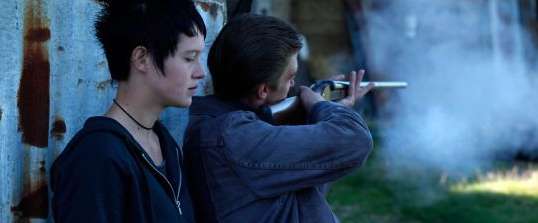
ALEXANDRA LEMATRE AND DAVID DEWAELE IN OUTSIDE SATAN
Poverty poetry
Hors Satan (Outside Satan) is vintage Bruno Dumont, elemental, brutal, poetic, nearly dialogue-free. Its main character (played by David Dewaele, also seen in Hadewijch) known only as "le Gars," "the Guy," is one of Dumont's odd rural types, small and lean, with a faroff look, his face pinched and shopworn. But also many other things. The film is all about faces. Almost all the action takes place outside, and the rough, unspectacular rolling landscape -- the other ever-present main character -- provides beautiful colors and lights that, shining on the face of "le gars," make it at times seem transcendent and beautiful. He is, after all, "outside Satan," beyond good and evil, because he can both murder and cure, crush and bring back from the dead, and humbly, unspectacularly, mysteriously, is ready to disappear, like Caine in Kung Fu, wandering the earth.
In a sense Hors Satan isn't "about" its action or its characters at all. It's pure cinema, creating a world out of nothing, like Lisandro Alonso in Los Muertos, with a Carl Dreyer-esque breath of transcendence such as Carlos Reygadas introduces into the Mexican Menninites in Silent Light. But of course there is not the suspenseful narrative of Los Muertos or the rich social world of Silent Light. This could only be Dumont, and those who like his work will love it and those who dislike it will hate it. This is abstract art, ugly-beautiful, and it will hypnotize you if you don't ask it too many rational questions; if you want something linear, progressive, and parsable, you'll squirm in your seat. If you let it flow over you, it sings in that strange way Dumont's best films do. With reserve but some fairness, Variety's critic Rob Nelson, calls the film "Maddening, pretentious, hypnotic and transcendent in roughly equal measure." More of a non-responder is the reviewer for Hollywood Reporter, whose critique is summed up thus: "Inarticulate characters, long blank stares, forced camera angles and allegorical nonsense make up this pretentious study in quasi-religious ennui." But then, one man's ennui is another man's trancelike state. The inarticulate characters evoke great silent film. The long blank stares allow the camera to explore the complexity of the faces. The "focrced camera angles" balance intimacy with detachment. The pretentious study allows simplicity to become reverberant richness.
Le Gars is a loner with a rifle who poaches and builds fires. He's joined by the sad, punkish girl known only as "Elle," "She" (Alexandra Lematre), who forms a bond with him, brings him food, prays with him, and makes a kind of platonic love by simply resting her head briefly on his shoulder, a curiously touching and meaningful gesture in this minimal and heightened world. Le Gars has powers that include immunity from detection when he commits acts that in ordinary terms are criminal. He kills Elle's abusive father, and a young man who has bothered her. What he does with an earthy female backpacker (Aurore Broutin) is harder to interpret. He brings Elle back to life. And then, like Caine, he hoists a makeshift sack on his back and wanders off.
But somehow that's not what Hors Satan is about at all. To begin with, these acts, these deaths, are understated, and seem like only poaching or taking potshots or carrying a heavy burden across a field. What happens on the screen is more about the sound of the wind; the rain; brush fire across the horizon recalling a photo by Bernard Faucon (but without the ragged boys); rich, beautiful grasses, dunes, and marshes; and the narrow river. (This is the Côte d'Opale region of France bordering on Belgium.) The wide aspect ratio contributes to this sense of a living, ever-present landscape that envelops the characters. This is why the camera often drops back to a long shot, a device Dumont has used often, in his war picture -- Flandres, for instance. Dumont works with poverty: poverty of landscape, of personality, of speech and emotion. This goes back to L'humanité (1999), with its rape, murder, police investigation, and unsolved mysteries. I remember walking out of the theater debating the film with a stranger, and that's what you could do with Hors Satan. That's what Dumont wants you to do, I suspect. If his films were more linear and coherent, if they didn't have elements that shock and confuse, they wouldn't awaken those raw feelings in viewers and start them thinking and arguing.
Meanwhile, thanks to smooth, textbook editing by Dumont and Basile Belkhiri, with blackouts separating main sequences; fine work by cinematographer Yves Cape; and sound design by Emmanuel Croset so precise even the footsteps on grass have a distinctive echo, Hors Satan looks and sounds perhaps better than any previous Bruno Dumont film, achieving beauties and religious overtones without the overt references resorted to in Hadewijch.
Hors Satan debuted at Cannes and has been in other international festivals. It opened in Paris October 19, 2011, to excellent reviews. Cahier du Cinéma's critic thought it "perhaps.... in the simplicity of the fable and the impressive economy of the mise en scène, his most direct and most beautiful film."
Screened for this review October 25, 2011 at MK2 Danton cinema in Paris, where the respectful and substantial matinee audience suggested increasing acceptance of Dumont by the French filmgoing public. Outside Satan opened in NYC 18 Jan. 2013 to generally favorable reviews (Metacritic: 63).
Last edited by Chris Knipp; 08-04-2015 at 03:28 PM.
 Posting Permissions
Posting Permissions
- You may not post new threads
- You may not post replies
- You may not post attachments
- You may not edit your posts
-
Forum Rules






 Reply With Quote
Reply With Quote



Bookmarks